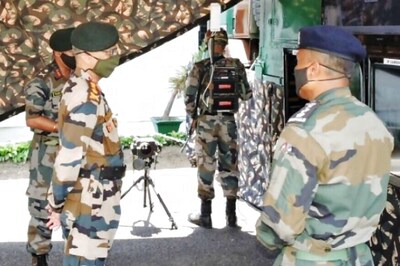
views
New Delhi: The India of 2017 is different from the India of 1962, Defence Minister Arun Jaitley said on Friday, hitting back at Beijing which had asked New Delhi to “learn” from the 1962 war. "If they are trying to remind us, the situation in 1962 was different, the India of today is different," Jaitley said at a media conclave.
Upping the ante, China warned India that it will escalate the current border row if Indian troops did not withdraw from "Chinese territory" and told New Delhi not to "clamour for war". Jaitley said that Bhutan government had made it clear that China was trying to claim Bhutanese land and said this was "absolutely wrong".
"After the statement of the government of Bhutan, I think the situation is absolutely clear. It is Bhutan's land, close to the Indian border, and Bhutan and India have the arrangement to provide security.
"Bhutan itself clarified.... China is trying to alter the present status-quo. After this, I think the issue is absolutely clear. To say we will come there and grab the land of some other country is what China is doing and it is absolutely wrong," the minister said.
Jaitley's comment came amid a stand-off between Indian and Chinese troops in Dokala area close to the Siliguri corridor that connects the rest of India to its north-east.
China on Thursday asked India to withdraw its troops from the Donglong area in Sikkim sector as a precondition for a "meaningful dialogue" to settle the boundary issue, warning that the Indian Army should learn "historical lessons", in an oblique reference to the 1962 war.
In an unprecedented action, Chinese Foreign Ministry spokesman Lu Kang also displayed a photograph of Indian "incursion" into Donglong area and said the dispute which is becoming a confrontation of sorts between the troops on the ground can only be settled by the withdrawal of Indian soldiers from the area.
Hitting back, the External Affairs Ministry on Friday said it was “deeply concerned” by the recent Chinese actions. The Ministry of External Affairs said that road construction would represent significant change of status quo with security implications for India.
“India is deeply concerned at the recent Chinese actions and has conveyed to the Chinese Government that such construction would represent a significant change of status quo with serious security implications for India,” MEA statement.
The MEA says that on 16 June, a PLA construction party entered the Doklam area and attempted to construct a road. A Royal Bhutan Army patrol attempted to dissuade them from this, while the Ambassador of the Royal Government of Bhutan (RGOB) publicly stated that it lodged a protest with the Chinese Government through their Embassy in New Delhi on 20 June.
However, Kang said the Indian troops "trespassed" the recognised delineated boundary between China and India on June 18. This is the first time China has come out with a precise date about their claim of Indian troops entering the disputed Doklam area (referred by China as Donglong) near Sikkim allegedly to stop Chinese troops from constructing a road.
“So the most pressing issue should be the withdrawal of troops into the Indian territory. So it is the pre-condition for any meaningful dialogue," he said when asked whether any talks were going on between the two countries over the issue.
He said in additions to the photographs of alleged Indian "incursion" into Donglong area, the Chinese foreign ministry will also upload a map on its website to provide a "better understanding of the reality".
He also refuted Bhutan's allegation that Chinese troops' attempts to build the road violated the 1988 and 1999 agreements to maintain peace and tranquilly. Lu said China has "indisputable sovereignty over the Donklam area."




















Comments
0 comment